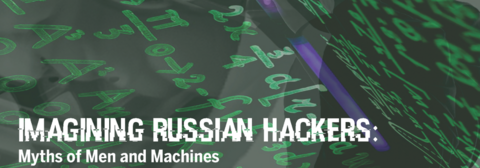* To Watch the interviews please fill out the online registration form (here).
Interview with Marielle Wijermars Watch lnterview
10/08/2020
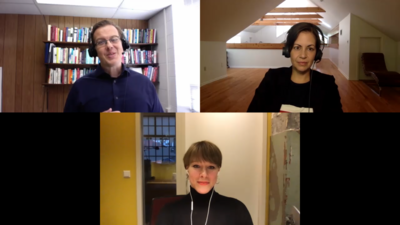
In this interview, Marielle Wijermars offers an informative, sobering, and stirring critique of Russian hackers, which she terms “the Ghost of Christmas Past,” a figure from the past that will not leave us alone. The emblematic Russian hacker figures actively in debates about cyber warfare and, if left unchecked, may help tilt the balance of weighing invidivual freedoms against national security clearly toward security. Information may even come to be seen as principally a dangerous commodity, thereby securitizing many aspects of civilian life. In particular, she calls for epistemological humility, public trust in reliable institutions, and the need for ongoing critical inquiry and questioning.
Russian hackers are not a gray-scale question. To diversify the image of the hacker, Prof. Wijermars draws our attention to various cases: the discordance between the sexy appeal that nations need to attract the young into their information technology industry and the actual work of hackers, which is slow, boring, and repetitive; activist groups that are not clearly anti-Kremlin; the case of Pavel Durov, the founder of Telegram, the state’s ban on the service, and the accusation against him of being an anarchist (near terrorist); and the flaws of keeping the Russian state at the center of the narrative that falsely presupposes control and coordination.
Interview with Dennis Yi Tenen Watch Interview
10/30/2020
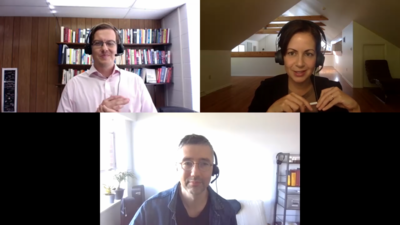
The second interview of the series with Dennis Yi Tenen opens with the question: what is wrong with the term ‘Russian Hackers’? No one – be it professional system penetrators or those engaged in amateur tinkering of computing devices – would ascribe the term “hacker,” whose image is tainted by popular culture. Moreover, what is often referred to in the media by ‘Russian hackers’ is the hackers of the post-Soviet states, where the concept of Russianness is in fact deeply problematic. Drawing on the tinkering sub-culture dating from the pre-internet era and his personal experience, Tenen proposes to imagine new constellations other than the national – not just within or beyond the national border, but also that of family, neighborhood, and workplace – to think about the question of Russian hackers.
Tenen also opens vistas onto the practices of shadow librarians and informal activists in Eastern Europe. He underscores the complex transnational politics for creating online corpora of texts: for example, the mere presence of shadow librarians may both serve and challenge the conventional goals of the Russian state by, say, undercutting the ability of local publishing ventures to privatize content in Russia while also, at the same time, being accidentally useful to the Russian state’s anti-imperial resistance of Western copyright regimes abroad; but even this example – because it centers around the Russian state – pales in comparison to the richness of the transnational migratory flows of labor and content that Tenen suggests ethnographically here.
Interview with Sean Guillory Watch Interview
11/18/2020
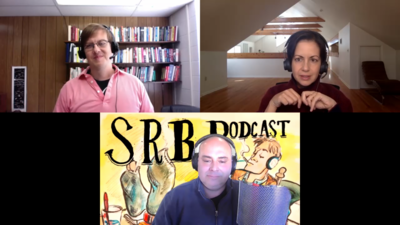
In this lucid interview, Sean Guillory calls for a deliberate underdetermining of our enemy imaginaries by recognizing in our imagination of the Russian enemy the triumph and the transgression of our own culture. The dichotomy of Russia as criminality but emerging power, at the center of the American imagination of Russian power since the 1990s, formed the images of Russian men as criminality, the ostentatious oligarch, and Russian women as fulfilling traditional patriarchic values and as sex objects. Race is also an inextricable part of this imagination. The “almost but not quite” whiteness of Russians make them the ‘worthy’ enemies, against whom racial language can be safely used, and the “bulwark of white Christian civilization” on the periphery of whiteness, in the imagination of American conservatives. The Russian hacker, in this context, is the new enemy figure: it is a “faceless, almost phantasmagoric figure” that poses the threat of manipulation by “burrowing into the very wiring of how we conduct our everyday lives.”
While it seems on the surface that the Russian bashing in American political discourse has shifted from right to left, Guillory argues that it has in fact always served the disciplinary function for the center to manage the margins and police the peripheries: for the Republicans in the early Cold War, Communism was a way to discipline the isolationist fringe, whereas, for the Democratic party, it is a way to discipline its left. Guillory trenchantly points to the problem of “disciplining conceptualization” to the ‘standard’ understanding of the American society that is at the heart of the matter. The anxiety about technology, privacy, security, and freedom is consolidated into something easier to wrap our heads around – the Russian hackers – instead of dealing with the complicated issues in the infrastructures of the American society.
Interview with Alexandra Simonova Watch Interview
1/12/2021

In this wide-ranging conversation, Aleksandra Simonova, a Ph.D. candidate who has gained rare access to the people and spaces behind so-called “Russian hacking,” draws on ethnography stretching from the mid-2010s to the present to ground, critically reterritorialize, and correct many misplaced media images surrounding Russian hackers. Neither a disembodied mob of bots nor intensely embodied super villains, the creative programmers and communities in the Russian IT sphere that she studies are exceptional in several senses: they are among the first in our series to self-identify as hackers; they also live and work in specific sites and locations, which she historically contextualizes as “spaces of exception,” and then describes through a series of examples of how hackers, makers, and other IT workers often attempt to create a local, temporary sense of community and possibility afloat in a sea of overlapping sovereignties.
In particular, Simonova describes and compares the Neuron hackerspace in downtown Moscow and the state-backed science town of Skolkovo outside of Moscow. She also touches on the imaginary battlefield of the Soviet creative entrepreneurial engineer, the grey zones of hacking state politics that follow in the 1990s and 2000s, the recentering of the state in hackerspaces around the 2014 US sanctions against Russia, and the overlapping sovereignties of the Crimea. By providing various pictures of these spaces of exceptions, Simonova makes clear that there is no de-spatialized virtual hacker: all hackers work from a place and the internet is an enormously symbolic-material complex. Networked life does not transcend, as once thought, so much as amplify already complex borders, boundaries, territories, and complex sovereignties.
Interview with Gabriella Coleman Watch Interview
2/02/2021
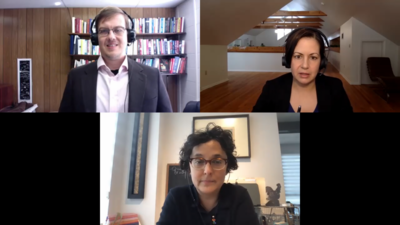
In this signal interview, the leading anthropologist of hacking Gabriella Coleman, building on her 2021 Henry Morgan Lectures, lays out a much broader framework for rethinking the so-called Russian hacker-phenomenon. Namely, by calling attention to what she outlines as “public interest hacking” or the “hack-leak combo” (or hacks that disclose materials that would interest the public with political consequences), Coleman raises steering questions set to recolor a stable of perennial hacking themes. One of those questions is, might it be that some of the sloppiness of the 2016 DNC hack was deliberate, or at least usefully open in the Russian state’s cooptation of public interest hacking – and if so, to what ends?
She also traces the history of the public interest hacking frame to watershed moments from the 1990s to 2014. Recurring themes throughout the wide-ranging conversation feature the experimental epistemology of hacking, the implementation of the high-risk tactics of hacktivists by nation states and the inversion of this directionality, causing non-state hacking to be suspected as state-led activities as Coleman illustrates with the example of k-pop fans on Twitter, the rewriting of a naive progressive-hacktivist-versus-nationstate-dialectic with closer attention to the ways that states are not singular and that different agencies in the same state (such as France in the 1990s) may embrace and reject compromise with underground technical class at the same time, and the drawing attention to transnational hacking fields, such as Latin America, not currently in the media spotlight. The conversation also touches upon the value of history, ethnography, and graduate studies in recovering and bring about a more healthy critical study of global hacking and state hysteria.
Interview with McKenzie Wark Watch Interview
2/10/2021

In this interview, McKenzie Wark provides valuable insights into the questions that are overwritten by the foregrounding of the Russian hacker as the ‘folk devil’ of our time. As the West returns to the off-the-shelf narrative of the Russian hacker to channel its anxiety in the waning of globalism, it shifts focus from and obfuscates the parallel stories of other more tangible threats, such as nuclear war and climate change. She also criticizes Atlanticism embedded in the Russian hacker phobia phenomenon that alludes to the center’s inability to face its own racism and the success story of the Chinese version of Leninism.
Wark further demonstrates how the hacker ethos was rehistoricized as it was co-opted by businesses and states: the figure of hacker went through a modification from a polyvalent term that incorporates amateurism, free-play, unalienated labor, to being pushed over more and more to criminalization, lawlessness, propaganda, disinformation, and state politics. As some alternatives to today’s hacker narrative, Wark draws on the case of the non-utopian and practical avant-garde project of the trans-European urban network of the 90s and poses the possibility of viewing the Russian hacker as a part of the ‘topology of the other’ in media. Along with typical racialized others such as the Nigerian scammer and the Indian call center worker, the Russian hacker narrative betrays the waning and hardening of nation state as a tractor of belief in today’s quasi-fascist world, the fear of penetrability, and the longing for the sense of shared being and shared project.
Interview with Eliot Borenstein Watch Interview
03/15/2021
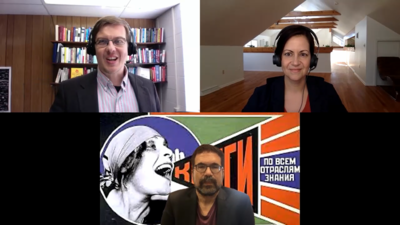
In this interview, Eliot Borenstein sheds new light on the politicization of Russophobia in both Russian and American political contexts. While the seemingly irrational but fairly grounded paranoia about Russian hackers surged after the 2016 election in the US, Russophobia has existed in Russia even in times when Russia received surprisingly little attention from foreign powers. Borenstein brings to our attention how Russophobia, as a useful discourse that can be deployed to dismiss any kind of criticism directed towards Russia, has been internally motivated and played out in favor of the Russian elites.
Borenstein also discusses the phenomenon of trolls – the weaponized tricksters that require less technical skills than hackers but extremely effective in disrupting the internet milieu. Pointing out Russia’s aptness in trolling even before the internet, Borenstein draws our attention to the effectiveness of trolling and how it fits well with the current culture of cynicism and disruption. The Russian government’s strategy in regard to the internet is not to repress but to get in the mix and mess everything up: thus, encouraging trolling and co-opting of the hackers into serving the purpose of the state, complicating the left’s belief that the playful, postmodern counterculture of the hackers belonged to them. Borenstein further emphasizes the importance of thinking about the reception of trolling and hacking, especially in regards to how the hysteria of hackers and trolls might hack our minds even without their presence.
Interview with Lev Manovich Watch Interview
04/06/2021

In a conversation equally wide-ranging as it is personal, theorist of digital culture Lev Manovich imagines an “inverted world” vision that counters, through what he calls the transnational reach of “extended Russia,” conventional western histories of hackers, artificial intelligence, and cultural analytics. His comments begin by identifying milestones on the pathway to modern computing environment from Russian contributors abroad, including innovations in machine learning, deep learning, and convolutional networks. In many ways, the story of the last century of information science and technology in the West, despite the distorting reflections of Cold War rivalries, has been an extended, global, multilateral collaboration from, across, and beyond extended Russia and Eurasia. As a way to contextualize and enrich the history of hacking, he further draws attention to other century-long histories of the Bauhaus and its lesser known parallel and predecessor, the Russian school of design VHUTEMAS, which coalesced in the 1920s, when the avant-garde enjoyed state support and public influence even among the sciences. He then opens up about his own personal biography as a self-described Russian hacker, in the broad sense of the term as one who “walks around the rules for efficiency,” outlining his training in computer programming without computers in St. Petersburg and then his political emigration and settling into a computer animation startup in New York City in the early 1980s. He also describes the revelation that was the combination of graphic-user interfaces, networking, screen culture, website self-publishing, the globalizing economy, and the collapse of the Soviet Union that marked, for him, the very year—1991—that the twenty-first century began. Since then, he notes that the Russia state has been early to politicize and visualize social media, recently mobilizing TikTok humor videos against political opponents, such as Navalny. An overarching point for Manovich remains that the twenty-first century does not yet know how to properly visualize the web or online culture, both for the enormous scale of network activities and the invisible interface for most online activity—the keystrokes of keyboards and phones. Toward a better way to visualize hackers, he outlines the interwoven genres of industry and information aesthetics: the first is that of the factory floor iconic to the recent modern period (roughly 1880 and 1970), typified by Vertov’s camera-crashing wheels and muscular workers (and where, today, Hollywood fight scenes often take place and whence the “mining” in data mining) and the second is, circa the 1970s to the present, a shift to the both off-the-shelf, sealed-box devices, coupled with mundane office-space behavior and superhuman scales of information aesthetics. How could one make a symphony scale to that of both Google and the Donbas, he wonders? Calling for critical attention to gender and shifts in digital culture, he concludes by offering that one of the reasons it may remain a challenge to imagine Russian hackers is that hacking is no longer visible as an identifiable specialty: hacking, broadly understood, has become our new humdrum reality. Perhaps we are all now extreme knowledge workers.
